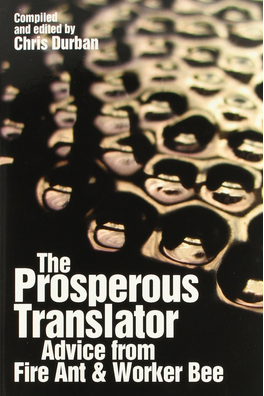January 2015 Issue
Read, Comment and Enjoy!
Join Translation Journal
Click on the Subscribe button below to receive regular updates.
Fire Ant & Worker Bee

Q:
Dear Fire Ant & Worker Bee,
I’ve just had the most frustrating of phone calls. I make a living delivering high-end translations and recently convinced a new client to work with me despite my high rates. I worked really hard on this translation, had it proofread by a colleague, and delivered it ahead of time. The guy who ordered the translation is the Investor Relations Manager. A former journalist, he proofread my translation, thought it was OK and forwarded it to the CFO. Unfortunately, the CFO thought the style wasn't right. Too journalistic. Not simple enough, not to the point enough. So he had it edited internally.
I've asked for a copy of the final text, in order to know what was wrong in the CFO's eyes. But I can’t help seeing this as damage control: it's hard to justify a high price when “style” is not OK. What should I do?
Aiming High
A:
Dear Aiming,
Ah, style. Even when you've already done the heavy lifting needed to get your big toe, foot, then knee in the door, it takes time to consolidate ties and get into sync with a new client’s preferred style. That’s only natural, and the fact that the Investor Relations Manager gave your work the green light is a good sign.
But in-house politics can be particular, too. The best response we know is exactly what you did: remain upbeat and positive, and ask to see the CFO’s version—not in a challenging, defensive way, but because “it’s extremely helpful for me to know exactly what style you are aiming for". Which happens to be true.
You might also add a forward-looking “... so I can move in that direction on our next text.”
FA & WB
Q:
Dear Fire Ant & Worker Bee,
I am on the executive committee of our translator association and am surprised at the energy some people put into complaining about our events. There is always something wrong. If the topic was good, the speaker was inarticulate. If the topic was timely and the speaker was good, the venue was poor. If the venue was comfortable and central, the timing was inconvenient. If the timing was fine, the refreshments were too bland or skimpy. If the sandwiches were tasty, the coffee was too strong or too weak—or there was no orange juice.
I'm not making this up, we actually have people who carry on like this. How can we bring them around or, if that is not possible, get them to shut up?
Meeter & Greeter
A:
Dear Meeter,
How many people are carrying on like this? And are they doing this orally or in writing?
If you yourself have invested lots of energy in your event, you may be overreacting. Step back and ask a few other attendees: did they notice the Serious Problem flagged by your unhappy campers, and did it inconvenience them? If so, fix it. End of story. If not, consider putting together a feedback form so you can quantify the complaints.
But don’t forget that every association has a few chronically unhappy and aggressive people—guys who gird up for battle before they step out the front door or sit down behind their keyboard. Remember, too, that letting social skills slip is an occupational hazard for the self-employed, who may be unaware that bleating on endlessly about the poor ventilation, uncomfortable chairs and color scheme of your meeting place is offputting and unhelpful.
One approach is to listen attentively for a minute or two, then broaden your one-on-one exchange to bring in those around you: “Fred, can you come over here—Sandra’s unhappy about X, what do you think?” That can add some perspective and bring the complainer the attention she craves. It might even lead to some on-the-spot brainstorming for solutions.
The situation is different if the braying interferes with the event itself. In this case, address the room directly, but phrase your query in a way that allows you to get on with it: “Paul feels that translators should focus on linguistics, not marketing; shall we suspend today’s session on ‘Marketing tips for translators’ or address this during coffee afterwards?” This gets the event back on track and may even prompt the room as a whole to shout down the complainer if he starts up again. As long as things stay good-natured, this is by far the best solution.
FA & WB
Q:
Dear Fire Ant & Worker Bee,
I have a lot of bilingual expat friends who are native French speakers and get asked to do translations now and then. Since they know I am a translator, they will often come to me for advice about what rates to charge, etc. The problem is, I am not even sure that they are really qualified to do any translating (most of the time, their request begins with “I have never done this before so I have no idea what to charge”) and it makes me uncomfortable to encourage them to take translation jobs when they are very likely not qualified—I feel like I'm perpetuating the idea that any "bilingual" person can translate or interpret.
I usually just tell them something vague about making sure that what they ask is enough to be worth the time they spend, and advise them that it really depends on the language combination and subject matter as far as what the usual rates are (which is all true, and I actually don't really know what the going rate for English to French is anyway since it isn't my language combination). Do you have any advice on how I can answer this question the next time it comes up?
Tactful Professional
A:
Dear Tactful,
A lot depends on how much time you are prepared to invest in the exchange that may ensue. The one response we’d rule out would be simply citing a per-word price pulled from any of the existing rate surveys found on line—some more serious than others—since that really does relay the message that any ol’ bilingual can do this.
What you want is to get them thinking about the big picture, which you can do by drawing their attention to writing skills and time factors, e.g.:
“Translation is surprisingly time-consuming for people who don’t do it regularly.”
“What kind of text are you being asked to translate? Are you confident you have the subject-matter knowledge to handle it?”
“Are you a good writer?”—keeping in mind that many professional translators are themselves surprisingly skittish about answering this one.
“You’ll need an editor, so be sure to line one up and calculate that into your price.”
Anecdotes are also effective. A friend of ours reports that her cousin once called her in the same situation: “When it was all over, he was horrified at how time-consuming the process was. He had totally lost his shirt on the deal because he'd underestimated the demands of the task.” You might recycle that story, again to get your friends thinking more carefully about the big picture.
Legal liability is another issue that gives amateurs pause, as well it should. And unless your friends are set up in business in a way that entitles them to issue genuine invoices, they could have administrative problems.
But what if the friends, however casual their initial query, have the potential to become good translators? After all, many talented translators have started out just as you describe—using an unsolicited opportunity to dip their toe in the water, and moving on to build a thriving practice.
With this in mind, we suggest that you provide enough information to (1) freak out the superficial wannabe, and (2) get a serious candidate intrigued enough to investigate further. Refer the latter to professional associations and reliable sources of information, starting with brochures like “Translation, Getting it Right” and the new “Interpreting, Getting it Right”, both of which can be downloaded from the ATA website.
These Fire Ant & Worker Bee Q&As were originally published on the Translation Journal April 2012 edition.
 Written by Chris Durban, author of the book, Prosperous Translator. The book is available on Amazon.
Written by Chris Durban, author of the book, Prosperous Translator. The book is available on Amazon.
"Some of the Web's pithiest advice on building a successful translation practice. Translation is the grandest, most foolhardy enterprise that humans can engage in. Done right, it can also be a lucrative and intellectually satisfying career."
